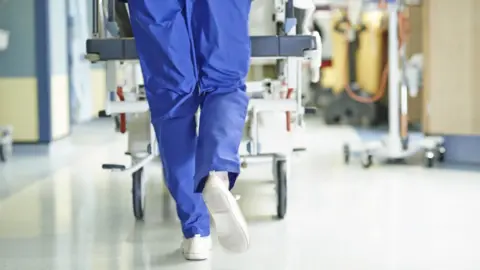Meeting to avert junior doctors' strike in England fails
 Getty Images
Getty ImagesJunior doctors say their 72-hour strike in England is set to go ahead after a "disappointing" meeting with the government on Thursday.
Talks with Health Secretary Steve Barclay were "a facade", said British Medical Association (BMA) reps, who accused him of stalling tactics.
It comes as other health unions have been invited for formal pay talks and nurses have begun theirs.
The government says any NHS pay offers must be affordable for taxpayers.
Ambulance workers, nurses, physios and, most recently, junior doctors have organised walkouts over pay.
Nurses - and other NHS staff except doctors - were given an average of 4.75% this year.
But unions say salaries need lifting higher than this to keep up with rising costs of living because of inflation.
The Treasury has said any increase above 5% would be unaffordable and risk fuelling inflation.
Inflation is expected to fall, which will also be a factor in pay negotiations.
The Royal College of Nursing last month said it was pausing strike action to begin "intensive talks" with the government over "pay, terms and conditions, and productivity enhancing reforms".
It is not clear what the final pay offer might be.
Some 14 other health unions in England, including those representing ambulance staff, physios and midwives, have said they may enter formal pay talks with the government, but are waiting for more details first.
The BMA, meanwhile, says it has not had any meaningful discussions yet.
Co-chairmen of its junior doctors' committee, Dr Robert Laurenson and Dr Vivek Trivedi, called Mr Barclay a "professional delayer," claiming he held the talks at the Department of Health without a mandate to negotiate.
Unless more negotiations happen, junior doctors plan to strike for 72 hours from 13 March, and Dr Laurenson said: "We will not call off the strike action until there is something meaningful to give to our members to vote on."
Matthew Taylor, chief executive of the NHS Confederation, said: "Healthcare leaders will welcome the news that the government has offered to open talks with all unions involved in the strikes.
"We have been calling for the government time and again to open negotiations with all unions and this is a very positive step in the right direction.
"We would hope that all trade unions representing healthcare professionals across the NHS accept this olive branch from the government and are prepared to come to the table with the aim of reaching a compromise with the government as quickly as possible."
A Department of Health and Social Care spokesperson said: "Any deal needs to strike a balance between giving NHS staff a fair deal and delivering on our promise to halve inflation this year.
"In order for talks to start, all planned strike action must be called off with immediate effect."
